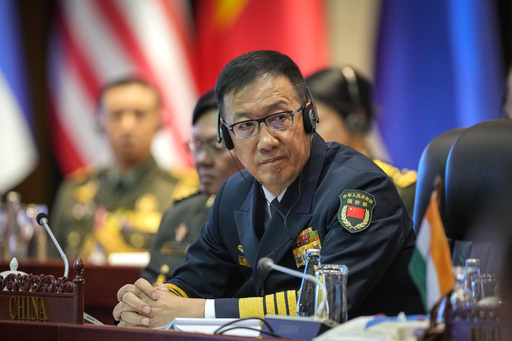Defense Chiefs from Southeast Asia Gather for Security Discussions in Laos
Confrontations in the South China Sea Prompt Important Talks
Defense ministers from Southeast Asian nations convened on Thursday in Laos for essential security discussions that included representatives from China and the United States. This dialogue comes as tensions escalate due to China’s more assertive claims over a substantial portion of the South China Sea, resulting in a rise in confrontations in the region.
The private discussions brought together U.S. Secretary of Defense Lloyd Austin and Chinese Defense Minister Dong Jun, although a request for a private meeting between the two was declined by Dong. Austin expressed disappointment over this decision, labeling it a setback for the entire region, particularly given the ongoing efforts by both nations to strengthen military communication.
As ASEAN member nations cautiously observe the transitions in the U.S. administration amidst a backdrop of escalating maritime disputes with China, the context of the meetings could influence future relations. Under President Joe Biden, the U.S. adopted a “free and open Indo-Pacific” approach, but how President-elect Donald Trump will navigate the situation in the South China Sea remains uncertain.
In addition to the U.S. and China, nations such as Japan, South Korea, India, Russia, Australia, and New Zealand participated in the ASEAN meetings.
Regional Concerns and Broader Issues Addressed
The discussions with ASEAN dialogue partners were anticipated to also cover other pressing international issues, including tensions on the Korean Peninsula, the ongoing conflict in Ukraine, and various wars in the Middle East.
Prior to his visit to Laos, Austin held talks with defense officials in Australia and Japan, where they reaffirmed their commitment to supporting ASEAN and voiced serious concerns regarding destabilizing actions in both the East and South China Seas. These actions include aggressive maneuvers by China against both Philippine and other regional vessels.
ASEAN members, including Vietnam, Malaysia, and Brunei, hold competing claims against China in the South China Sea, a region that Beijing asserts as predominantly its own. Other ASEAN countries include Indonesia, Thailand, Singapore, Myanmar, Cambodia, and Laos.
While negotiations continue between China and ASEAN for a code of conduct to regulate activities in the contested waters, progress has been sluggish due to complex issues, particularly whether the agreement should hold binding authority. There have been multiple clashes this year between Chinese and Philippine vessels, and Vietnam recently reported incidents in which Chinese forces attacked its fishermen in contested waters.
Myanmar’s Ongoing Turmoil Impacts ASEAN Credibility
Another critical issue facing the region is the ongoing civil war and humanitarian crisis in Myanmar. The credibility of ASEAN is being tested as the military in Myanmar, which ousted an elected government in 2021, continues to engage in conflicts against pro-democracy groups and ethnic insurgents. An estimate suggests that the military currently controls less than half of the country.
Since late 2021, Myanmar’s military leaders have been excluded from ASEAN meetings, although high-level bureaucrats have represented the country at events, including a recent summit in October. During the defense meetings, the representation included Zaw Naing Win, who oversees international affairs at Myanmar’s Defense Ministry.
In addition to defense matters, discussions on military cooperation, transnational haze issues, disinformation, border security, and transnational crimes—including drug trafficking, cybercrime, and human trafficking—were also on the agenda, as stated by a spokesperson from Thailand’s Defense Ministry.
